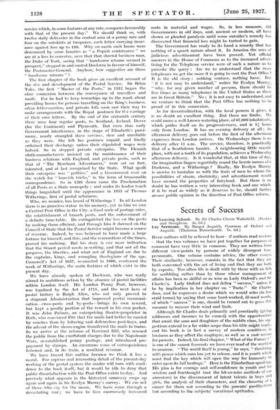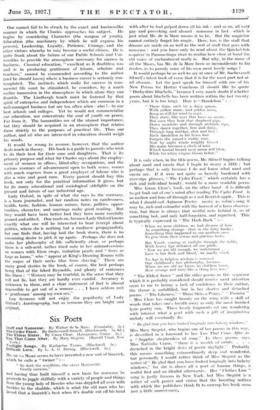Secrets of Success
Borst authors will be' relieved to hear—if authors read reviews — -that the two volumes we have put together for purposes of comment have very little in common-. They are written from different view-points. by persons of widely divergent tem- peraments. One volume contains advice, -the other essays. Their similarity; however, consists in the fact that they arc both concerned with the art of living and that they are both by experts. Too often life is dealt with by- those within itch for scribbling rather than by those whose management of affairs has been as skilful or as wise as Lady Okford's and Sir Charles's. Lady Oxford does not define " Success," unless it be by implication in her chapter on " Taste." Sir Charles does, and he expresses a desire which we Would echo (in less staid terms) by saying that some hard-worked, ill-used words, of which " success " is one, should be turned out to grass this summer to recover their wind and limb.
Although Sir Charles deals primarily and practically (giving addresses and incomes to be earned) with the opportunities that await the sons and daughters of the middle class, his sug-
gestions extend to a far wider scope than his title might imply and his book is in fact a survey. of modern - conditions in business as they affect the employee, as well as a vade memos for parents. Indeed, his final chapter, " What of the Future ?" is one of the sanest forecasts we have ever read of the world of to-morrow. " The world itself is young," he says;-" throbbing
with power which man has yet to release, and it is youth which must find the key which will open the way for humanity to enter upon its full heritage." Here is the Elizabethan speaking. His plea is for courage and self-confidence in youth and for wisdom and forethought (not the hit-or-miss methods of out
ancestors) • in the discernment of -latent talents in boys and girls, the analysis of their characters, and the choosing of a
career for them not according to the parents' predilections but according to the subjects' vocational aptitudes. One. cannot fail to be struck by the exact and businesslike .manner in which Sir Charles approaches his subject.. He begins by considering Character (the weapon of youth), Education (the machinery by. which he will express his powers), Leadership, Loyalty, Patience, Courage, and the other virtues whereby he may become a useful citizen. He is quite frank about the failure of our Public Schools and Uni- versities to provide the atmosphere necessary for success in business. Classical education, " excellent as it doubtless was and is in producing gentlemen of leisure, scholars and teachers," cannot be commended according to the author (and he should know) where a business career is seriously con- templated. The instincts which make for success in com- mercial life must be stimulated, he considers, by a much earlier immersion in the atmosphere in which alone they can flourish. The Lindbergh touch must be fostered by that spirit of enterprise and independence which are common in a well-managed business but are too often alien—alas !—to our best schools and colleges. Yet he would not commercialize our education, nor concentrate the soul of youth on pence.
Far from it. The humanities are of the utmost importance, but they should be acquired in an atmosphere that relates them strictly to the purposes of practical life. Thus our author, and all who are interested in education should weigh his words.
It would be wrong to assume, however, that the author deals much in theory.. His book is a guide to parents who wish to do their best for their sons and daughters. That is its primary purpose and what Sir Charles says about the employ- ment of women in offices, blind-alley occupations, and the various avenues of advancement open to both sexes, conies with much cogence from a great employer of labour who is also a wise and good man. EVery parent should buy this book, not only for the practical information it gives, but for its many educational and sociological sidelights on the present and future of our industrial age.
Lady Oxford, in spite of what she says to the contrary, is a born journalist, and her random notes on carelessness, health, taste, fashion, human nature, fame, politics, oppor- tunities, character, and marriage make good reading. But they would have been better had they been more carefully pruned and edited. One reads on, because Lady Oxford knows exactly what one will be interested to hear (except about politics, where she is nothing but a mediocre propagandist), but one finds that, having laid the book down, there is no consuming desire to pick it up again. Perhaps she does not make her philosophy of life sufficiently clear, or perhaps there is a sub-acid, rather tired note in her animadversions on women with Eton crops, imitation pearls and faces as large as hams,".who "appear at King's Drawing Rooms with the nuque of their necks blue from shaving." There arc many good stories in the book, of course, the best perhaps being that of the faked Reynolds, and plenty of sentences like these : " Women may be truthful, in the sense that they will not lie, but they are hardly ever candid. Accuracy is unknown to them, and a clear statement of fact is almost impossible to get out of a woman ... . I have seldom met
' gentleman ' among my own sex."
Lay Sermons will not enjoy the popularity of Lady Oxford's Autobiography, but as sermons they are bright and original.















































 Previous page
Previous page